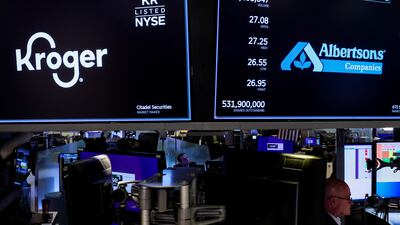Kroger has agreed to buy Albertsons in a deal with an enterprise value of $24.6 billion that would create a US grocery giant with almost 5,000 stores and annual revenue of about $200bn.
Investors will receive $34.10 for each share in Albertsons, which includes a special dividend, the companies said in a statement on Friday.
That reflects a premium of about 33 per cent to the closing price on October 12, the day before Bloomberg News first reported on the deal talks. The companies plan to offload as many as 375 stores through a spinoff if they can’t find buyers for them.
The proposed tie-up gives rise to a grocery giant with increased buying power and an opportunity to save on costs as brick-and-mortar retailers invest heavily to enhance their online offerings.
While the deal would create a beefed-up competitor to Walmart and other rivals, it’s sure to face tough antitrust scrutiny as US regulators under President Joe Biden cast a more sceptical eye on big mergers.
“This combination will expand customer reach and improve proximity to deliver fresh and affordable food to approximately 85 million households,” the companies said.
“Consistent with prior transactions, Kroger plans to invest in lowering prices for customers and expects to reinvest approximately half a billion dollars of cost savings from synergies to reduce prices for customers.”
Kroger shares fell 7.3 per cent to $43.16 at the close in New York, while Albertsons dropped 8.5 per cent to $26.21 after a big gain on Thursday.
Kroger rose 1.7 per cent this year through October 12, the day before Bloomberg News reported on the deal talks. Albertsons fell 15 per cent during the same period, while an S&P index of consumer-staples companies slid 12 per cent.
The deal’s purchase price could decrease. It hinges on how much cash Albertsons decides to funnel to shareholders through its dividend and on how many stores are spun off.
The combination ranks among the retail industry’s biggest transactions in years, evoking such deals as Amazon.com’s purchase of Whole Foods Market in 2017 for $13.7bn and the $9.8bn acquisition of Albertsons itself in 2006 by CVS Health, Supervalu and an investment group led by Cerberus Capital Management.
The companies said they would squeeze about $1bn in “annual run-rate” cost savings within the first four years after the deal closes, net of divestitures, thanks to improved purchasing, technology investment and optimised manufacturing and distribution networks. They will use $500 million of the savings to cut prices.
Kroger said it has $17.4bn in fully committed bridge financing from Citigroup and Wells Fargo & Co. The deal includes the assumption of $4.7bn in net debt and is expected to close in early 2024, the companies said. Kroger chief executive Rodney McMullen will lead the combined company.
The combined company would face a competitor of comparable size in terms of grocery sales: Walmart. During their most recent fiscal years, Kroger and Albertsons brought in a combined $209.8bn in sales. Walmart’s US stores generated $218.9bn in groceries. That excludes sales at Sam’s Club, Walmart’s chain of warehouse stores.











